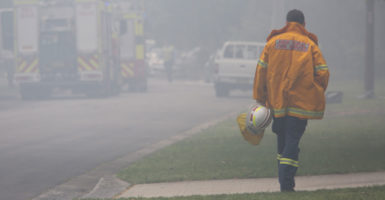Last fall my husband was one of three firefighters to save a family from an apartment fire. All three men won an award from the county for their courage.
But my husband, who also is an emergency medical technician, won’t be stepping up to receive that award any time soon. The ceremony was canceled because of COVID-19.
I haven’t heard a peep of complaint from him, and I know I won’t. First responders don’t like to be fawned over. In fact, they often refuse even modest appreciation (unless it’s in the form of a baked good).
They shrug off praise and glory—even when glory inevitably finds them.
Yet, there are times when they can’t shrug off heroism. Times when they can’t hide from the public’s gratitude. The night of the apartment fire last fall was such a moment.
The work of all first responders in the midst of COVID-19 is another.
Firefighters and EMTs can take safety precautions, but they can’t stay home—not until they themselves are infected. Until that point, they must be on duty and ready to deal with the many maladies of life that refuse to stop so that we can deal with COVID-19, the disease caused by the coronavirus.
Cars still flip over. People still get trapped in tight spaces. Children still get sick. Houses still burn.
These situations call for brave men and women who, by virtue of their jobs, cannot practice “social distancing,” even as their families do.
And there lies the trade-off. As is the case with our nation’s brave doctors, many firefighters and EMTs return to their families every morning after having been up all night responding to the usual house fires, gas leaks, and traffic accidents, but also to confirmed and potential COVID-19 patients.
As of this writing, most firefighters are coming home to families in deliberate isolation—families that, until Daddy or Mommy came home, were relatively safe.
For the past two weeks, my three boys and I have been able to shut ourselves off from the outside world and from the coronavirus. But we can’t shut ourselves off from Daddy.
Daddy is the exception. Daddy is the vector.
To put yourself in a situation such as this is a decision all first responders—and their spouses—must make early on. In our case, my husband and I knew when he signed up for the job that the medical needs of complete strangers often would come before the needs of our own family.
Last year, my 7-year-old gashed his head open on a metal coffee table, requiring four stitches at a local urgent care center. My husband was on duty. I recall some grumbling and a little self-pity as I loaded the kids into the car.
That particular evening, Daddy was helping another child, a toddler who was having trouble breathing. That child needed him more.
Right now, the people who need my husband and others like him the most are the sick, the elderly, the weak of our community. They need a man or woman who doesn’t realize how heroic it is to put up with a chronic lack of sleep, physical discomfort, worry, stress—and now the potential of bringing home a deadly disease to their own families.
My husband told me years ago that he wants to be the one who helps someone on their worst day. He made this decision because he cares about people—all people—from the junkie passed out behind 7-Eleven at 3 a.m. to the daughter who is trying to explain in panicked Farsi that her mother is still in the burning house. Everyone.
Together, he and I have made the silent decision to put others first. But this is the reality of COVID-19. It has forced us all to engage in the most sickening and heart-wrenching of triage.
The choice is simply more vivid: We must all choose to help the weakest among us.
So when my husband comes home at 6:15 a.m., stooped and weary, his eyes gray, his gear bag over his shoulder, I wipe down the door handles with Lysol. I disinfect his bag and his steering wheel. He washes his hands. I give him a hug. And life goes on.
And we hope for the best.
In the end, we are all in God’s hands, and God still expects us to do what is right.
This article was modified slightly March 25 at the request of the author.





























